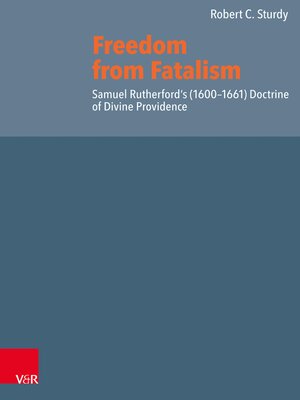Freedom from Fatalism
ebook ∣ Samuel Rutherford's (1600–1661) Doctrine of Divine Providence
By Robert C. Sturdy

Sign up to save your library
With an OverDrive account, you can save your favorite libraries for at-a-glance information about availability. Find out more about OverDrive accounts.
Find this title in Libby, the library reading app by OverDrive.



Search for a digital library with this title
Title found at these libraries:
| Loading... |
Samuel Rutherford's (1600-1661) scholastic theology has been criticized as overly deterministic and even fatalistic, a charge common to Reformed Orthodox theologians of the era. This project applies the new scholarship on Reformed Orthodoxy to Rutherford's doctrine of divine providence. The doctrine of divine providence touches upon many of the disputed points in the older scholarship, including the relationship between divine sovereignty and creaturely freedom, necessity and contingency, predetermination, and the problem of evil. Through a close examination of Rutherford's Latin works of scholastic theology, as well as many of his English works, a portrait emerges of the absolutely free and independent Creator, who does not utilize his sovereignty to dominate his subordinate creatures, but rather to guarantee their freedom. This analysis challenges the older scholarship while making useful contributions to the lively conversation concerning Reformed thought on freedom.






